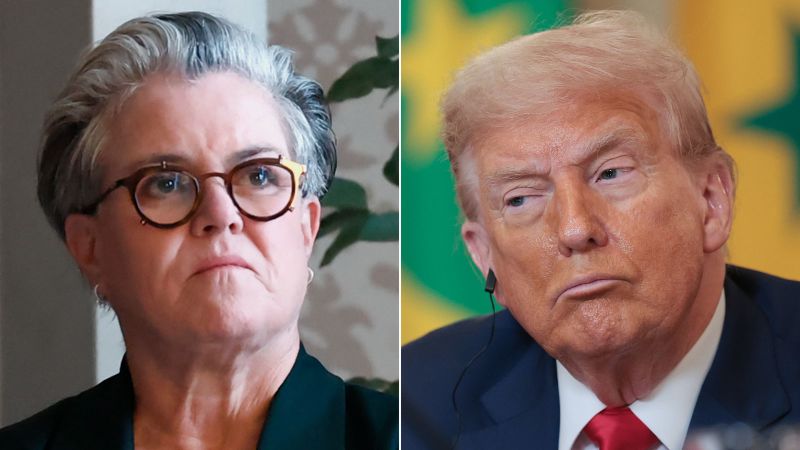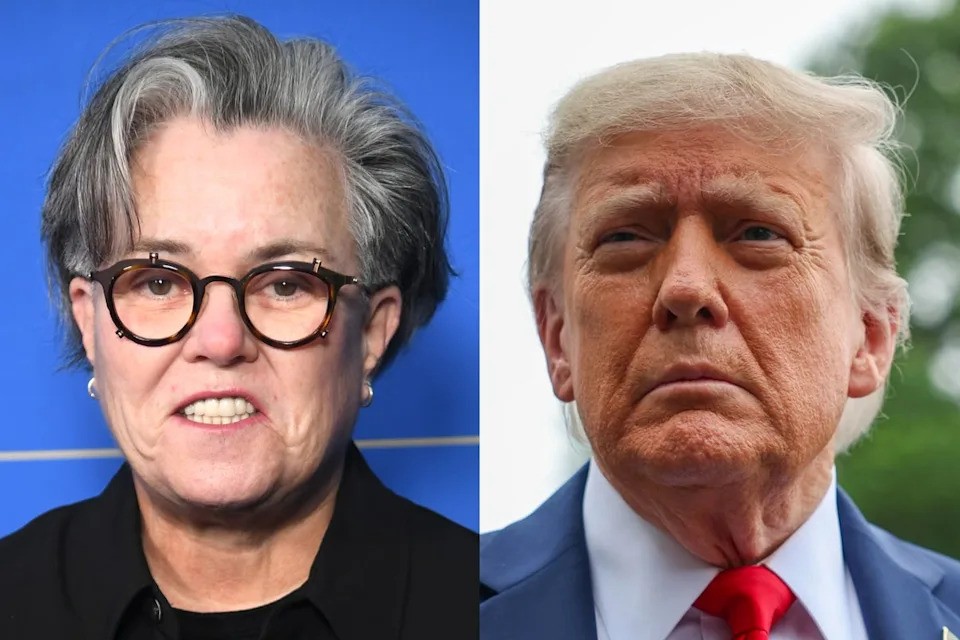For decades, Rosie O’Donnell has been a household name in America — a comedian, actress, talk-show host, and outspoken personality who built her career on sharp wit and unflinching honesty. But in 2025, O’Donnell is living thousands of miles away from the country where she rose to fame, having traded her longtime home in the United States for a quieter life in Ireland.
The decision wasn’t made lightly. According to O’Donnell, her self-imposed exile was a direct consequence of Donald Trump’s rise to political power and his continued targeting of her, both publicly and personally. The clash between the comedian and the former president has spanned nearly two decades, but with Trump’s return to the White House after the 2024 election, O’Donnell says she could no longer remain in the U.S. without risking her well-being and peace of mind.
Her move has come with significant sacrifices — most notably, missing one of the proudest moments of her life as a mother: her daughter’s college graduation. And while O’Donnell celebrated the milestone from afar, she has openly shared the pain of being absent, attributing the absence directly to the fraught political climate that has made her one of Trump’s favorite targets.
On May 2025, Rosie O’Donnell posted a heartfelt message on Instagram celebrating her daughter’s achievement.
“My smart, beautiful, loving daughter Vivi is graduating from college,” O’Donnell wrote. “I’m so proud of her!!!!”
But instead of sitting in the audience, cheering with the rest of the family, O’Donnell watched the moment unfold from across the Atlantic Ocean. Speaking on the No Filter podcast in September, she explained why she was not there in person.
“My security staff advised me not to return to the United States for her graduation,” O’Donnell said. “The president would use me to rile his base. I’m his nemesis in his mind and to them. To a third of the country. That’s a very difficult place to be.”
For O’Donnell, the decision cut deep. She has five children and has long been vocal about how central motherhood is to her identity. Missing such a milestone moment underscored the personal costs of her choice to leave the U.S. — a choice she insists was not political grandstanding but an act of survival.
O’Donnell and Trump’s public feud dates back to 2006, when she criticized him on The View. What followed was years of insults, mockery, and attacks from Trump, who branded her “a real loser” and made her a recurring punchline in interviews, rallies, and social media posts.
“He hasn’t stopped using me as a punchline ever since,” O’Donnell reflected on No Filter. “Many, many, many male comedians did what I did and worse, but he didn’t go after them in the way he went after me because he’s misogynistic and sexist and cruel.”
The relentless targeting, she explained, took a toll not only on her public image but also on her private life. “I knew that the last time he was in office was very difficult for me. I was eating too much. I was drinking too much,” she admitted. “It was taking a toll on my mental health.”
The pressure wasn’t limited to online harassment. O’Donnell recounted an incident at a CVS store, where a man wearing a MAGA hat approached her and her child and shouted: “Screw you. Trump won.” Such encounters reminded her of how politically charged her very existence in America had become.
“I wanted to take her to a place where decency still lived,” she explained of her decision to move her family abroad. “And where I wouldn’t have to witness what he was going to do to the country, which he outlined in the Heritage Foundation’s Project 2025.”
If O’Donnell had hoped distance would diminish Trump’s attacks, she has been sorely mistaken. Even while she is living in Ireland, the former president has continued to lash out at her, escalating his rhetoric to dangerous territory.
In July 2025, Trump took to his Truth Social platform to threaten O’Donnell’s citizenship. “As previously mentioned, we are giving serious thought to taking away Rosie O’Donnell’s Citizenship,” he posted, alongside a distorted image of her face. “She is not a Great American and is, in my opinion, incapable of being so!”

The threat has no constitutional basis. Birthright citizenship is explicitly guaranteed under the 14th Amendment of the U.S. Constitution, which states that anyone born on American soil is automatically a citizen. Yet Trump has continued to dangle the idea publicly, framing O’Donnell as a “Threat to Humanity” and urging her to stay in Ireland.
“She is not in the best interests of our Great Country,” Trump wrote in one post. “She is a Threat to Humanity, and should remain in the wonderful Country of Ireland, if they want her. GOD BLESS AMERICA!”
While many dismiss Trump’s threats as political theater, O’Donnell says they are not empty words to her. After years of being singled out, she takes them seriously, especially when coupled with the hostility she faces from some of his supporters.
Despite the hardships, O’Donnell has found solace in her new life overseas. She describes Ireland as a place where “decency still lived,” offering her and her children the chance to escape the hostility that had become a daily part of life in the U.S.
Her decision mirrors that of other American celebrities who have relocated abroad, citing political or cultural disillusionment. Yet for O’Donnell, the move is less about rejecting America and more about preserving her own sanity.
“I knew I had to leave for self-preservation,” she said. “It wasn’t about making a statement. It was about saving myself.”
The transition has not been without challenges. Leaving behind her career opportunities, her friends, and even major family events has been painful. But O’Donnell says the tradeoff is worth it for the peace of mind she has found away from the political chaos that has consumed much of her public identity in the U.S.
Interestingly, O’Donnell revealed on the podcast that despite being one of Trump’s most public adversaries, she has never actually spoken to him directly. “I’ve never had a conversation with him,” she admitted, even though she once attended his wedding.
That absence of personal interaction has not stopped Trump from painting O’Donnell as his enemy, a foil to rally his supporters against. For O’Donnell, it remains baffling — and deeply frustrating — that she became such a fixation for him.
Rosie O’Donnell’s story is one of the most striking examples of how the Trump era has reshaped the lives of public figures who dared to criticize him. For some, criticism brought professional backlash. For O’Donnell, it has meant a near-permanent estrangement from the country she once called home.
“I’m his nemesis in his mind,” she said. “To a third of the country, I am this villain. That’s a very difficult place to be.”
What makes her case unique is the deeply personal cost — the milestones missed, the mental health struggles, and the decision to uproot her entire life just to escape the cycle of harassment.
The current administration has shown no sympathy for O’Donnell’s claims. In response to her comments, White House spokesperson Abigail Jackson told USA TODAY: “The President’s comments about Rosie O’Donnell have nothing to do with her gender and everything to do with her terrible personality and the fact that she is a threat to humanity!”
It’s the kind of response that underscores why O’Donnell says she feels she has no place in her own country anymore — her pain is dismissed, her concerns mocked, and her humanity disregarded in favor of political theater.
What comes next for Rosie O’Donnell remains uncertain. She has not indicated whether she plans to remain in Ireland permanently, or whether she may return to the U.S. after Trump’s presidency. For now, she appears committed to her life abroad, sharing snippets of her family life and reflections on social media, even as the political storm continues to swirl.

Through it all, O’Donnell remains steadfast in her resilience. She has endured ridicule, harassment, and threats, yet she has chosen to prioritize her own well-being and her children’s safety above all else.
Her story is not just about one comedian and one president. It’s a sobering reflection of the ways in which political polarization can deeply wound individuals, reshape lives, and even drive people away from the places they once called home.
For Rosie O’Donnell, exile has become a strange kind of freedom — a chance to reclaim her peace, even if it means missing some of the moments she treasures most.



